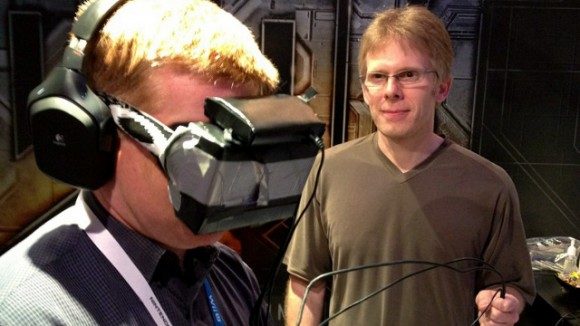In yet another twist in Oculus VR’s journey to finally bring Virtual Reality to gaming, The Elder Scrolls and Fallout publisher Zenimax Media is threatening legal action against the company over what they claim is unauthorized use of technologies that Zenimax owns.
The man at the center of this controversy is John Carmack, the man behind Doom and Quake whose former company, id Software, is owned by Zenimax. Carmack began working for Oculus VR on August 7, 2013, and subsequently quit id Software in November that year so that he could work full-time there.
According to Zenimax, Carmack had already begun working on VR technology while he was still on their payroll, and therefore by bringing his work over to Oculus VR, who have since been bought by Facebook for $2 billion, Carmack and Oculus are improperly reaping the benefits of their work without compensating Zenimax.
According to a 2012 non-disclosure agreement between id and Oculus obtained by Re/code, Oculus “shall not acquire hereunder any right whatsoever to any proprietary information … nothing in this agreement is intended or shall be construed as a transfer, grant, license, release or waiver of any intellectual property rights in any proprietary information.”
Here is a statement by Zenimax sent to Engadget regarding the fracas:
ZeniMax confirms it recently sent formal notice of its legal rights to Oculus concerning its ownership of key technology used by Oculus to develop and market the Oculus Rift. ZeniMax’s technology may not be licensed, transferred or sold without ZeniMax Media’s approval. ZeniMax’s intellectual property rights arise by reason of extensive VR research and development works done over a number of years by John Carmack while a ZeniMax employee, and others. ZeniMax provided necessary VR technology and other valuable assistance to Palmer Luckey and other Oculus employees in 2012 and 2013 to make the Oculus Rift a viable VR product, superior to other VR market offerings.”
“The proprietary technology and know-how Mr. Carmack developed when he was a ZeniMax employee, and used by Oculus, are owned by ZeniMax. Well before the Facebook transaction was announced, Mr. Luckey acknowledged in writing ZeniMax’s legal ownership of this intellectual property. It was further agreed that Mr. Luckey would not disclose this technology to third persons without approval. Oculus has used and exploited ZeniMax’s technology and intellectual property without authorization, compensation or credit to ZeniMax. ZeniMax and Oculus previously attempted to reach an agreement whereby ZeniMax would be compensated for its intellectual property through equity ownership in Oculus but were unable to reach a satisfactory resolution. ZeniMax believes it is necessary to address these matters now and will take the necessary action to protect its interests.
Oculus, meanwhile, suggests that besides being out of line, Zenimax is only stirring the hornet’s nest now because Oculus is clearly going to be very profitable in light of recent news:
It’s unfortunate, but when there’s this type of transaction [Facebook’s $2 billion purchase of Oculus], people come out of the woodwork with ridiculous and absurd claims. We intend to vigorously defend Oculus and its investors to the fullest extent.
Carmack himself wrote on his Twitter page that “No work I have ever done has been patented. Zenimax owns the code that I wrote, but they don’t own VR […] Oculus uses zero lines of code that I wrote while under contract to Zenimax.”
It is difficult to discern who is in the right at this point, but it seems that the non-disclosure agreement, which contains Oculus founder Palmer Luckey’s signature, will be critical to resolving the dispute.
Play games, take surveys and take advantage of special offers to help support mxdwn.
Every dollar helps keep the content you love coming every single day.

